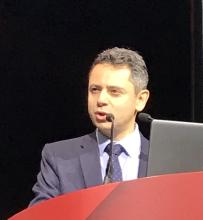, according to a study that suggests this approach would change treatment about half the time.
In patients with nonobstructive CAD, CCTA measurement of inflammation on the basis of the Fat Attenuation Index (FAI) “predicts fatal and nonfatal cardiac events independently from clinical risk scores and routine CCTA interpretation,” reported Charalambos Antoniades, MD, PhD, professor of cardiology, Radcliffe Department of Medicine, Oxford, England.
This analysis was based on data from ORFAN, an ongoing study that expects to eventually collect data from 250,000 CCTA. There were multiple goals. The first was to evaluate whether there is a need and a role of CCTA to risk stratify patients without obstructive CAD. A second objective was to evaluate if the FAI inflammation score can quantify residual risk in these patients.
Based on the answers to these questions, the investigators then proceeded to determine if an AI risk model that combines data from the FAI score and risk factors is widely generalizable and, in addition, whether it reclassifies patients in a way meaningful to management.
CCTA-based inflammation is promising
The answers to all these questions were yes, according to data presented by Dr. Antoniades in a late-breaker at the American Heart Association scientific sessions.
So far, ORPHAN, which has multiple participating sites in the United Kingdom, Europe, United States, South America, Asia, and Australia, have data on more than 100,000 CCTAs. Approximately 40,000 have been processed. Of these, 82% have had nonobstructive CAD and the remaining obstructive disease.
In long-term follow-up, the numbers of major adverse cardiovascular events (MACE) and cardiac deaths were compared in these two groups. In absolute terms, the nonobstructive CAD group had about twice as many MACE (2,587 vs. 1,450) and cardiac deaths (1,118 vs. 636).
The rate of these events was much lower in the nonobstructive group , which had four times more patients than the obstructive group, but Dr. Antoniades said these data demonstrate substantial rates of events in the nonobstructive group as well as an unmet need to identify and treat risk associated with nonobstructive CAD.
When determining if coronary inflammation as measured with CCTA could be a means identifying risk independent of other factors, the FAI scores were evaluated by quartile in a nested cohort of 3,666 consecutive patients. FAI, which has been validated, is calculated with spatial changes in CCTA-measured perivascular fat composition after standardization for anatomy and other variables.
The discrimination for risk with FAI was impressive. When evaluated across all patients (obstructive or nonobstructive CAD), those in the highest FAI quartile had a hazard ratio (HR) for MACE that was more than six times higher (HR 6.76; P < .001) and a risk of cardiac mortality that was more than 20 times higher (HR 20.20; P < .001) than that of those in the first quartile.
“The prediction was independent of all other risk factors,” Dr. Antoniades reported.


